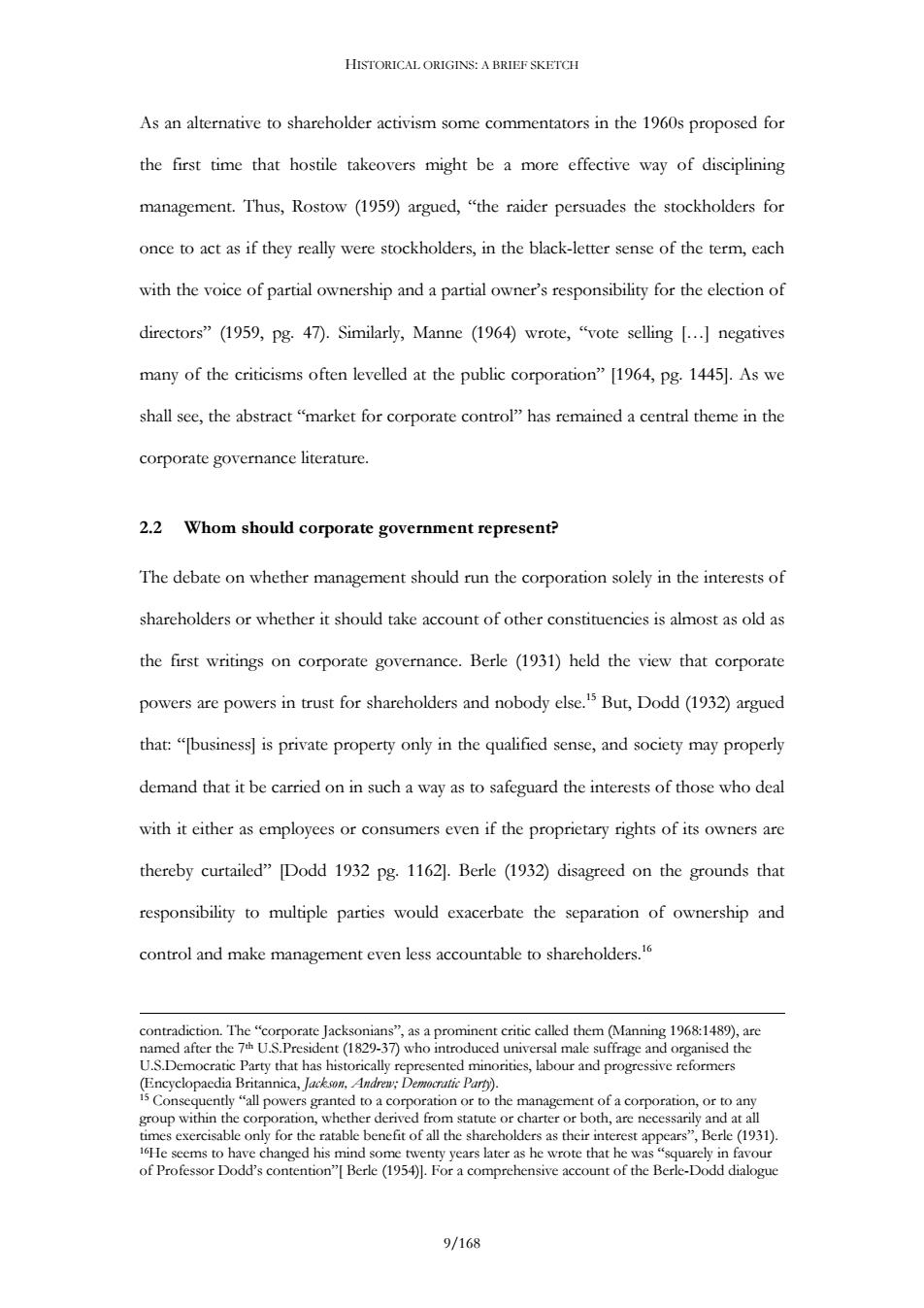正在加载图片...

HISTORICAL ORIGINS:A BRIEF SKETCH As an alternative to shareholder activism some commentators in the 1960s proposed for the first time that hostile takeovers might be a more effective way of disciplining management.Thus,Rostow (1959)argued,"the raider persuades the stockholders for once to act as if they really were stockholders,in the black-letter sense of the term,each with the voice of partial ownership and a partial owner's responsibility for the election of directors"(1959,pg.47).Similarly,Manne (1964)wrote,"vote selling [...negatives many of the criticisms often levelled at the public corporation"[1964,pg.1445].As we shall see,the abstract "market for corporate control"has remained a central theme in the corporate governance literature. 2.2 Whom should corporate government represent? The debate on whether management should run the corporation solely in the interests of shareholders or whether it should take account of other constituencies is almost as old as the first writings on corporate governance.Berle (1931)held the view that corporate powers are powers in trust for shareholders and nobody else.But,Dodd(1932)argued that:"business]is private property only in the qualified sense,and society may properly demand that it be carried on in such a way as to safeguard the interests of those who deal with it either as employees or consumers even if the proprietary rights of its owners are thereby curtailed"Dodd 1932 pg.1162].Berle (1932)disagreed on the grounds that responsibility to multiple parties would exacerbate the separation of ownership and control and make management even less accountable to shareholders.16 contradiction.The "corporate Jacksonians",as a prominent critic called them (Manning 1968:1489),are named after the 7th U.S.President(1829-37who introduced universal male suffrage and organised the U.S.Democratic Party that has historically represented minorities,labour and progressive reformers (Encyclopaedia Britannica,lackson,Andren;Democratic Part). is Consequently "all powers granted to a corporation or to the management of a corporation,or to any group within the corporation,whether derived from statute or charter or both,are necessarily and at all times exercisable only for the ratable benefit of all the shareholders as their interest appears",Berle(1931). 16He seems to have changed his mind some twenty years later as he wrote that he was"squarely in favour of Professor Dodd's contention"Berle (1954).For a comprehensive account of the Berle-Dodd dialogue 9/168HISTORICAL ORIGINS: A BRIEF SKETCH As an alternative to shareholder activism some commentators in the 1960s proposed for the first time that hostile takeovers might be a more effective way of disciplining management. Thus, Rostow (1959) argued, “the raider persuades the stockholders for once to act as if they really were stockholders, in the black-letter sense of the term, each with the voice of partial ownership and a partial owner’s responsibility for the election of directors” (1959, pg. 47). Similarly, Manne (1964) wrote, “vote selling […] negatives many of the criticisms often levelled at the public corporation” [1964, pg. 1445]. As we shall see, the abstract “market for corporate control” has remained a central theme in the corporate governance literature. 2.2 Whom should corporate government represent? The debate on whether management should run the corporation solely in the interests of shareholders or whether it should take account of other constituencies is almost as old as the first writings on corporate governance. Berle (1931) held the view that corporate powers are powers in trust for shareholders and nobody else.15 But, Dodd (1932) argued that: “[business] is private property only in the qualified sense, and society may properly demand that it be carried on in such a way as to safeguard the interests of those who deal with it either as employees or consumers even if the proprietary rights of its owners are thereby curtailed” [Dodd 1932 pg. 1162]. Berle (1932) disagreed on the grounds that responsibility to multiple parties would exacerbate the separation of ownership and control and make management even less accountable to shareholders.16 contradiction. The “corporate Jacksonians”, as a prominent critic called them (Manning 1968:1489), are named after the 7th U.S.President (1829-37) who introduced universal male suffrage and organised the U.S.Democratic Party that has historically represented minorities, labour and progressive reformers (Encyclopaedia Britannica, Jackson, Andrew; Democratic Party). 15 Consequently “all powers granted to a corporation or to the management of a corporation, or to any group within the corporation, whether derived from statute or charter or both, are necessarily and at all times exercisable only for the ratable benefit of all the shareholders as their interest appears”, Berle (1931). 16He seems to have changed his mind some twenty years later as he wrote that he was “squarely in favour of Professor Dodd’s contention”[ Berle (1954)]. For a comprehensive account of the Berle-Dodd dialogue 9/168